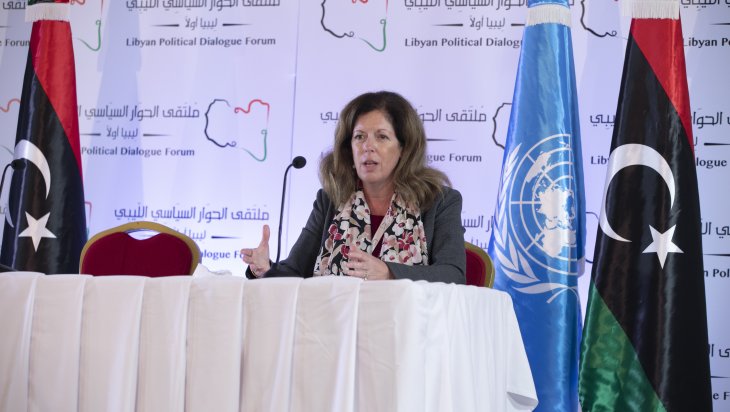The Current UN Peace Process in Libya: A Bridge Too Far?

Various developments have marked the peace process in Libya since the failure of the Libyan Arab Armed Forces’ (LAAF) Tripoli Offensive of 2019/2020. The latter, a reckless attack led by ex-general Khalifa Haftar against the UN-backed government,[1] thwarted plans for the National Conference in Ghadames, the last conference with the primary aim of organising elections before the recent 75-delegate Libyan Political Dialogue Forum (LPDF). The LPDF, a product of the Berlin Conference’s political track, was officially held from 7 to 15 November 2020 in Tunis – in-person from the third day.[2] An election date was agreed to for 24 December 2021, Libya’s Independence Day, and recent meetings have been an attempt to establish a new executive authority under the UN’s auspices.
From the LPDF’s launch, it was apparent that it was enabled to be an elite-level arrangement. The participants, compiled by the United Nations Support Mission in Libya (UNSMIL) in a top-down approach, included recycled figures from the past with dubious credibilities, and it was not the transparent process for which many had initially hoped. It was subsequently bogged down by vote-buying claims,[3] and its lack of domestic legitimacy since has been a bane. However, for idealists, the LPDF also offered a means to unite institutions before elections in December 2021. After the conclusion of the LPDF’s first round, one aspect that proved problematic during negotiations were selection mechanisms; this was eventually resolved in January after meetings in Geneva[4] and voting began on 1 February to last for five days. For the refurbished Presidency Council (PC), one candidate will need to be selected by the LPDF members from each region – for a total of 3 – with a minimum of 70%. For Prime Minister (PM), the whole Forum needs a minimum 70% to select. As this method may fail due to the noticeably high threshold, this will lead to a list-based procedure in which people assemble lists of four people for the various positions. The list that wins would have faced multiple hurdles to emerge victorious, but the essential tenet, of I’ll scratch your back if you scratch mine, remains the same.
The creation of a temporary government 11 months before elections has been a contentious proposition. On the one hand, it attempts to unite a fractured political landscape – including the UN-recognized government and its illegitimate eastern counterpart – to simplify election preparations. On the other hand, this bargaining attempt happens only at elite-level, and questions surround this executive authority’s actual transience and the slipperiness of that slope. Indeed, a multitude of prospective pretexts will be accessible, ranging from the Covid-19 pandemic to a constitutional process with longstanding ails. While candidates have pledged to UNSMIL to not stand for elections in the post-preparatory period,[5] as history has made clear, some promises never leave paper. This may explain why Prime Minister Fayez Serraj has not added his name to the lists of candidates – the 24 and 21 names for PC and PM, respectively, that have been on charm offensives. There have been suspicions that Serraj is betting on this fragile process to collapse, especially as some are indubitably going to be left disappointed by the final outcome. Moreover, the exclusivity of the process was compounded through the creation of an 18-member advisory committee to help decide on a selection mechanism,[6] or, put differently, to potentially facilitate the reverse-engineering of outcomes. By way of example, an Aguila Saleh and Fathi Bashagha combination has long been touted, and strong doubts subsist on whether this ‘dynamic duo’, if they are indeed nominated, can gain the domestic legitimacy required. The former has a past of bad faith behaviour, while the latter has business ties to countries such as France and the UAE that have well-known agendas for the region (hint: not to promote democracy).
Elections in December 2021 remain a hopeful prospect for Libyans. After years of manoeuvring and counter-manoeuvring by adverse domestic and external actors, this may be a propitious time to finally head in a democratic direction. However, this itinerary is not set in stone. There are enough malign developments to torpedo any, but particularly nascent, peace process. This includes the LAAF’s consolidation of the Sirte-Jufra axis and the lack of leverage on Wagner mercenaries.[7] Despite the international rhetoric that calls for foreign fighters to leave Libya, the 23 January 2021 deadline set by the October Ceasefire came and went with no changes. Additionally, confrontation lines have not been cleared; tensions have instead increased, and coastal roads remain closed. This leads to the deduction that, while conflict resolution is one eventuality, it may not be the likeliest one.
The international community needs to support one primary objective: helping Libya conduct successful elections on 24 December. The latter face a myriad of issues, including the ones above, and others, such as an inconsistent voting roll[8] and electoral integrity. While many recent municipal elections have been successful, some issues may become more prominent,[9] particularly given the higher stakes. Voter turnout is another deceptive concern. Ultimately, the LPDF began as an admirable conceptualisation for a “Libyan-Libyan solution”,[10] but its non-representative nature and neglect for accountability mean its only salvageable function should be purely facilitative. Indeed, facilitating elections is not even a task that necessitated the Forum’s input; it could have been achieved over the years through empowering existent authorities and isolating spoilers. An extensive preparatory period awaits, and while hope is not a strategy, seemingly in this case it will need to be.
[1] https://unsmil.unmissions.org/one-year-destructive-war-libya-unsmil-renews-calls-immediate-cessation-hostilities-and-unity-combat
[2] https://unsmil.unmissions.org/statement-acting-special-representative-secretary-general-libya-stephanie-williams-first-round
[3] https://www.libyaherald.com/2020/11/19/56-lpdf-members-call-for-suspension-of-those-accused-of-attempted-political-bribery-at-tunis-meeting/
[4] https://unsmil.unmissions.org/unsmil-announces-lpdf-approves-proposal-selection-mechanism-executive-authority-preparatory-period
[5] https://unsmil.unmissions.org/unsmil-announces-list-candidates-presidency-council-and-prime-minister-positions
[6] https://unsmil.unmissions.org/acting-special-representative-secretary-general-stephanie-williams-announces-establishment-lpdfs
[7] https://edition.cnn.com/2021/01/22/africa/libya-trench-russia-intl/index.html
[8] https://twitter.com/alwasatnewsly/status/1337462244846735363
[9] https://www.libyaherald.com/2021/01/16/ccmce-reruns-unsafe-elections-allegations-of-ballot-box-stuffing-by-armed-groups/
[10] https://unsmil.unmissions.org/opening-remarks-acting-special-representative-secretary-general-libya-stephanie-williams-meeting







